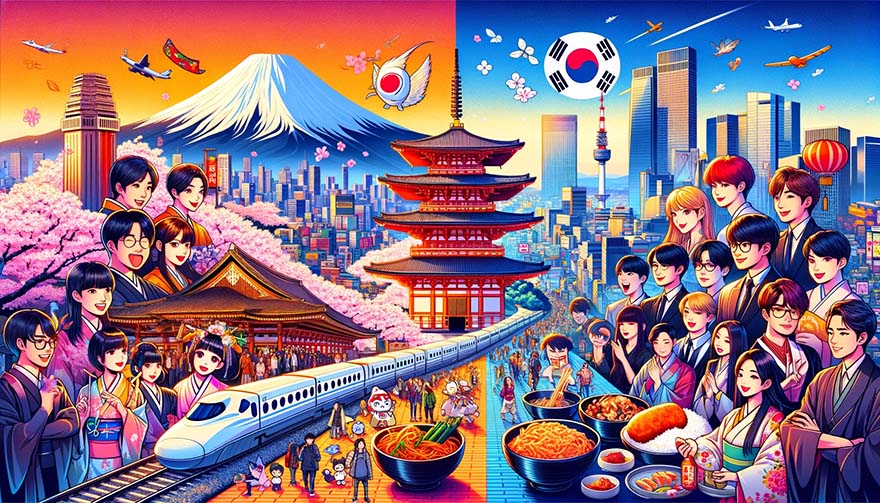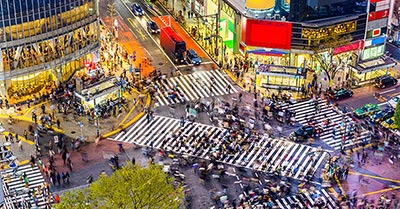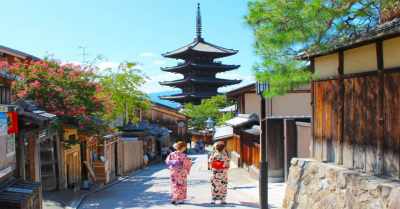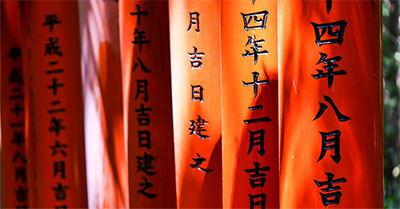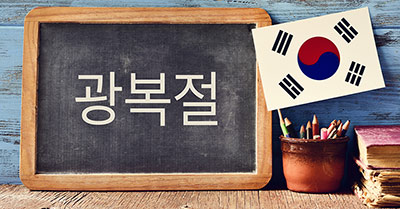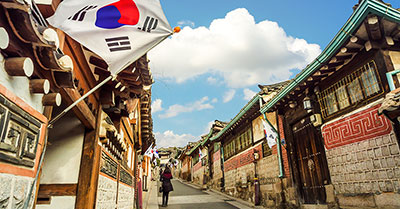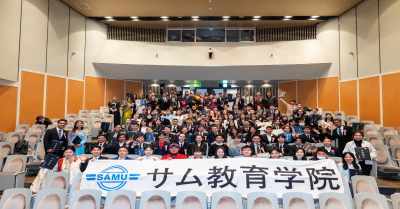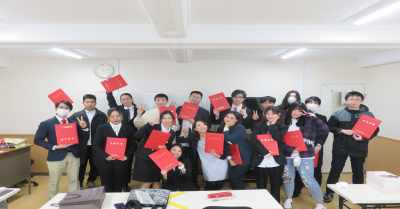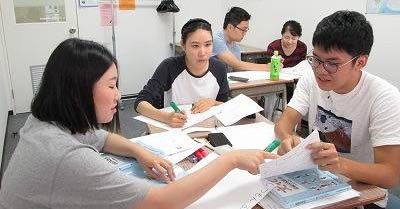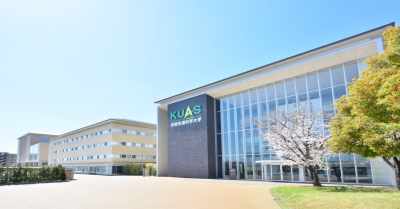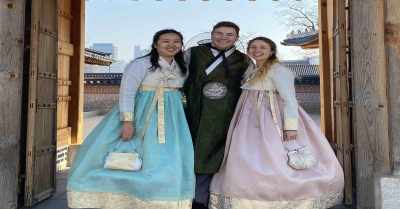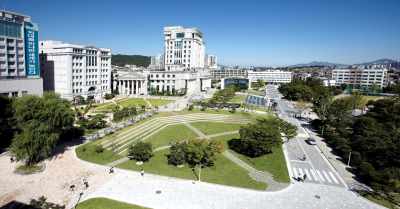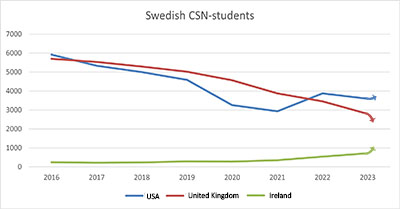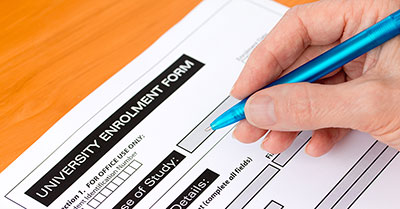Japan vs Korea for international students
Are you considering to study in Japan or Korea and want to learn more about these two countries? Here we will have a look at differences and similarities between Japan and South Korea.
I have helped thousands of students to study abroad in Japan and Korea, and I have traveled there almost yearly since 2006. Many international students are considering both these countries, but it is hard to know which is the best choice for you if you never have been there.
In this article I will give you my take on Japan vs Korea, looking at everything from sushi to K-pop, zen gardens to neon-lit streets. Here's your ultimate guide to choosing between Japan and South Korea for your study abroad adventure.
Culture: Anime vs K-Drama
National Personality: Reserved vs Dynamic
Boys to Japan, Girls to Korea: The Study Abroad Gender Divide
Food: More Than Just Sushi and Kimchi
Climate: fours seasons of magic, or three?
Safety: don't worry about your wallet
Cost of living and accommodation: from Rice Balls to Goshiwon
Language: The Three-Headed Linguistic Dragon vs The Logical Linguistic Puzzle
What can you study in Japan and Korea?
Student visas and applications: Apply on time and have patience
Final thoughts: Nihon vs Hanguk for international students
Culture: Anime vs K-Drama
Let’s get right to the point. In my experience, the youth culture is the number one reason why many young people want to study in Japan and Korea.
Japan is the Otaku paradise! The homeland of anime and manga. Akihabara in Tokyo is your go-to for all things otaku. The fashion scene, especially in Harajuku, is like walking through a real-life anime. Japan offers everything from ancient temples and serene gardens to buzzing arcades and robot cafes. The country is a blend of history and sci-fi-like modernity.
South Korea is the birthplace of K-pop and K-dramas. Gangnam is not just a song; it's a lifestyle. The youth culture here is vibrant, with music and fashion and beauty heavily influenced by pop icons. South Korea is your playground for urban adventures – think rooftop bars, hip cafes, and shopping districts that never sleep. And if you're into hiking, the landscapes outside the cities are breathtaking.
What is your preference?
National Personality: Reserved vs Dynamic
Japanese culture is known for its politeness and a certain level of introversion. It's all about respect and harmony. Maybe that is why I like Japan so much. Japanese people are seldom loud (unless they work in the fruit section in a Supermarket…) and despite all the people in the big cities you are unlikely to get bumped around. Even in big cities like Tokyo it is surprisingly easy to find privacy and quiet places on small streets, in parks, and in private booths in restaurants.
The drawback is that Japanese people sometimes can come across as a bit stiff and almost robotic in a professional role. But once you attend an afterwork with them or give them a karaoke microphone, you'll see their fun side too.
South Koreans are generally more outgoing and dynamic. It can be easier to make them smile while in a professional role, but in Korea you must also be prepared for the odd elbow on the underground.
Korea is a more extrovert society that loves socializing – whether it's in bustling cafes, nightclubs, or karaoke bars. It's all about whether you're in the 'in-group' or chilling in the 'out-group'. If you get truly accepted by some Koreans, you get access to a big part of their social network. In-groups are your ride-or-die crew – family, close friends, your work besties. They share inside jokes, unspoken understandings, and are all about deep trust. Outside this circle? That's the out-group, where things are more formal, kind of like keeping it polite with the barista at your favourite café.
Being In-group can really boost your social life in Korea. But don’t be surprised if your Korean friend’s young cousin that you have hardly met asks to come and stay with you for a week when he goes on a holiday to your home country five years from now…
Boys to Japan, Girls to Korea: The Study Abroad Gender Divide
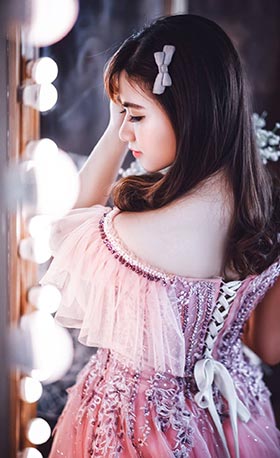
In my experience helping thousands of students to study in Japan and Korea, there is a big gender divide between the students going to these two countries. About 75% of the international students, I have helped to study in Japan have been guys, while about 75% of the students to Korea have been girls. Why is that?
Japan is like a magnet for anything techy, gamey, and anime. Think about it: Japan is the mecca for cutting-edge tech, home to the coolest video games, and the birthplace of anime. It's a world where samurai legends meet robot wonders, and where the car scene is more Fast & Furious than a Tokyo drift race. For the guys, it's not just about hitting the books; it's about living in a place where their favorite hobbies and interests come to life in the most epic ways. And as a bonus, introverted nerdy guys are much more accepted and popular in Japan than in most Western countries.
South Korea on the other hand is like walking into a real-life drama set, where every street corner feels like it's straight out of a music video. It's the land of trendsetting fashion and beauty, where street style is just as important as what you learn in class. The Hallyu wave isn't just about catchy tunes; it's about powerful, inspiring female icons and characters that resonate with young women today. It's more than just a study trip; it's about immersing in a culture that's shaping global female trends. And as a bonus Korean guys are not as shy as their Japanese counterparts.
Food: More Than Just Sushi and Kimchi
If you are a food lover you cannot go wrong with either of these countries. Japan and Korea has some of the best food in the world, so don’t be a coward hanging out in McDonalds, go explore the local food and you are in for a real treat!
Japanese cuisine is all about precision and perfection. From sushi to ramen to bento boxes, it's a treat for the taste buds. The food quality is really high, so you don’t have to worry about getting a bad stomach here. In fact, a cheap ramen place or Kaiten-Sushi (conveyor belt sushi) in Japan will serve better food than many high-end Japanese restaurants abroad. Even supermarkets in Japan offers great ready food. If you go there in the evening you can buy it at bargain prices for a tasty low-cost meal at home.
Japan offers a great variation of food from seafood dishes like Sashimi, Takoyaki, and Tempura to meat dishes like Yakitori, Sukiyaki, and Shabu shabu to Soba, Okonomyaki, Gyoza, Onigiri and much more. The Japanese pubs, Izakaya, offer great food at reasonable prices. Forget about ordering your own plate with a big hamburger. Here you share oichi sashimi, skewers, edamame, and many small dishes with the others in your group. Tabe-nomi-hōdai (all you can eat, all you can drink) is a very popular concept with international students in Japan.
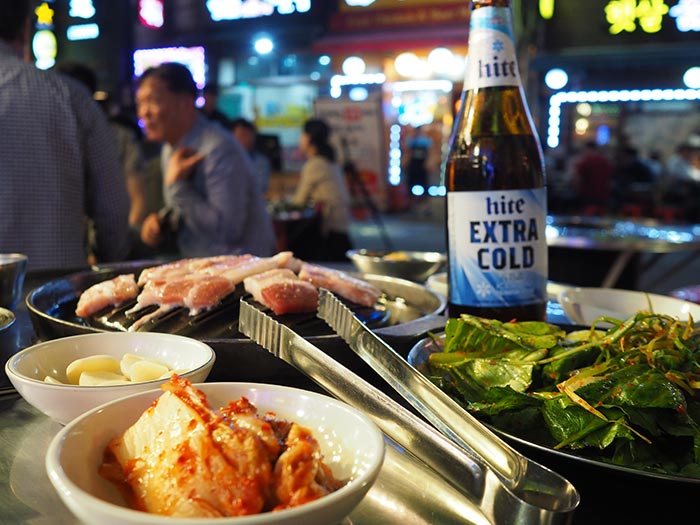
South Korean food is a spicy, flavorful journey. From Korean BBQ (hello, unlimited side dishes) to street food markets, your taste buds will be in for a rollercoaster. And yes, Korean fried chicken is a must-try – it's literally everywhere.
Who has not heard about Kimchi-jjigae, Bibimbap, and Bulgogi? And nothing beats a Korean Barbeque on an upended barrel in a back alley in Seoul. On the side you will be served an endless amount of garlic, kimchi and other accessories and you pour it all down with Cass or Soju.
So, who is the winner? This is literally a matter of taste. If you’re into strong spices and street food then Korea is your pick. If you care for a nice presentation and love seafood Japan would be your choice. Personally, I would give a small edge to Japan for offering even more variation, but both countries are fantastic when it comes to food.
Climate: fours seasons of magic, or three?
Japan is known for its four seasons of magic – snowy winters, blooming cherry blossoms in spring, hot summers, and stunning fall foliage. However, this is a truth with modifications. On Hokkaido in the north and the mountain regions in the middle of the country with the Olympic city of Nagano you can experience snowy winters with great skiing. But in Tokyo, Kyoto and many other popular student cities in Japan there is no real winter and you are unlikely to see snow.
The spring and fall are generally considered the best time to visit Japan. With perfect temperatures resembling a Scandinavian summer. The summers in central and southern Japan get very warm, wet and humid, with temperatures that often go above 30 degrees Celsius in July and August. December to February has an average temperature of 5-10 degrees Celsius in Tokyo. For people from the north this is far from cold, but with the poor insulation of Japanese houses indoor temperatures can become uncomfortably cold this season if you don’t leave your AC on.
South Korea's climate is similar, but the winter is longer and colder with icy Siberian winds coming down from the north. So, you are actually more likely to experience four seasons in Korea than in Japan. The good news is that floor heating systems were first invented in Korea and over 90% of the houses in South Korea have Ondol – floor heating, making it more comfortable indoors during the winter months.
All in all, the weather alone should not be a deciding factor between those two countries. If you are really into winter and skiing you can choose to study in a city like Nagano or Sapporo in Japan. There are also several skiing resorts close to Seoul. If you prefer warmer weather you can look at subtropic Okinawa in Japan or Jeju in Korea, but there the study options are more limited.
Safety: don't worry about your wallet
Japan has one of the lowest crime rates in the world. We’re talking about a place where losing your wallet is more like a surprise adventure in getting it back than a tragedy. Walking home alone at night feels as safe as a cozy Netflix binge. And compared to the US, with its action-packed crime rates, Japan is a peaceful haven.
But, it’s not all sunshine and rainbows – Japan does have its share of natural drama. Earthquakes, typhoons, and the occasional volcanic hiccup remind you that Mother Nature’s got her own plans. Yet, Japan’s readiness and tech-savvy approach to disaster management are so on point, so if you ever must experience an earthquake there is no safer place to be than in Japan.
Crime rates in Korea are slightly higher than in Japan when it comes to things like assault, drug use, theft, and traffic incidents. But the good news is that South Korea is still much safer than the US and most south European countries.
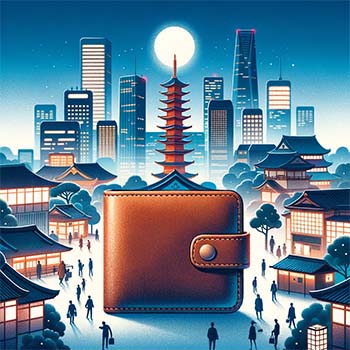
Natural disasters in Korea? They’re more about dramatic weather episodes than full-on blockbusters. Sure, you've got your monsoons and the occasional shiver from a minor earthquake but they are not as impactful as in Japan.
So, in summary both countries are very safe. If you are worried about natural disasters then Korea is your pick, but if you want the lowest possible crime rates then Japan is your choice.
Cost of living and accommodation: from Rice Balls to Goshiwon
Japan has a reputation for being pricey, but this does not match my experience. Whether you go shopping for food, clothes, or camera gear you tend to get more for your money in Japan than in Europe, especially if you consider the quality of what you get. However, in my opinion South Korea is a bit cheaper than Japan, not least when looking at public transportation which by the way is excellent in both countries, no need for a car here!
Tokyo and Seoul are some of the biggest cities in the world. This also means enormous price gaps so do your research. High end restaurants and clubs can be staggeringly pricey, but if you are street smart you can also live very cheaply.
In Korea Street food like tteokbokki will keep your stomach and wallet full. Plus, you can find some cool, budget-friendly K-fashion pieces to spice up your wardrobe. In Japan your local Ramen restaurant, fantastic vending machines, and discounted ready food in the supermarkets in the evening will keep you full on a budget.

Student housing is where it can get pricey in the big cities in Japan and Korea. You usually don’t pay more than you would in many Western countries, but the standard and the size of your room might not be what you expect. From Korean mini studios (Goshiwon) to Japanese 12 square meter apartments, these countries are the masters of compact living.
As an international student you can often book dormitory accommodation through your school. But be prepared to share a room and be ready for a lot of rules and curfews. Check out our websites YourHomeinJapan.com and YourHomeinKorea.com if you want more options and get help to book independent accommodation at favourable prices.
Language: The Three-Headed Linguistic Dragon vs The Logical Linguistic Puzzle
Let’s face it many Japanese and Korean people are not good at English, so learning the local language is the key to understanding the culture, getting local friends, finding a job, and fully enjoy life in Japan and Korea.
Embarking on the Japanese language journey is like deciding to climb Mount Fuji—exciting, intimidating, and oh-so rewarding. Japanese comes at you with not one, not two, but three alphabets: the simpler Hiragana and Katakana, and the ever-daunting Kanji (“Chinese character”). It's like playing a video game where each level ups the challenge, and Kanji is the boss fight with over 2,000 characters used in daily life. But don't let that scare you! Mastering these scripts unlocks a world where ancient poetry coexists with manga madness.
Yet, Japanese has a soft side too—its grammar is quite systematic, and there's a beautiful harmony in its sounds. Plus, there's no need to wrestle with tones like in some other Asian languages. The real kicker? The layers of politeness in Japanese speech that can make you feel like you're navigating a social labyrinth. One wrong verb form and you've accidentally insulted someone's grandmother. Oops!
Now, let's swivel over to Korean, the language that walks into the club and everyone notices. Why? Because Hangul, the Korean writing system, is a marvel of logic and design. Invented by a king who clearly had a knack for user-friendly interfaces, Hangul can be learned in a day, making you feel like a linguistic superhero. It's got a phonetic system that's as straightforward as ordering a kimchi jjigae.
But don't let Hangul's simplicity fool you. Korean grammar will have you bending and twisting like you're in a linguistic yoga class. The levels of formality in Korean also take you on a rollercoaster ride of respect and hierarchy. And let’s not forget the challenge of vocabulary, where words can change their outfits faster than K-pop stars change their hair colors. Plus, Korean has its own set of sounds that'll have your tongue doing gymnastics it never signed up for.
What can you study in Japan and Korea?
As we discussed above learning the language is the obvious starting point. In Japan this is usually done in private Japanese Language Schools regardless of the length of your course. In Korea you can take shorter courses at private language schools like LTL Korea and longer courses with a student visa at a Korean Language Institute (KLI) in a university like Konkuk in Seoul.
But what about other subjects? While most universities offer some courses in English, full degrees in English are often limited to a few liberal arts programs such as Global Studies, Political Science, Business, and Asian studies. However, we can also help you with some other degrees in English, for example Mechatronics and Robotics at Kyoto University of Advanced Science.
Another alternative is to go as a study abroad-student where you cherry pick classes in English that match the degree you are taking at your home university. This is usually only possible if you are enrolled and have studied at least one year towards your degree in another country. In Japan your university also needs to have an exchange agreement with the school you want to study at, but in Korea our partner Korea Exchange can help you with independent study abroad-semesters at selected universities in Seoul and Busan.
Many students are also interested in practical subjects such as Anime, Manga, Fashion, Music, Graphic Design etc in these countries. However, in Japan these subjects are usually only taught in Japanese at vocational schools, Senmon Gakko, so you need to start by learning the Japanese language in a language school.
For more details about this see our articles about studying in Japan and Korea.
Student visas and applications: Apply on time and have patience
Do I need a student visa to study in Japan or Korea? Yes, for long term courses (20+ weeks) you need a student visa. Many nationalities can visit these countries for 90 days on visa waiver for tourism, business, or short language courses. For longer courses a student visa is usually needed, but some nationalities can also apply for a Working Holiday visa that lasts for one year, which gives you the permission to work (with some limitations) and take language courses.
In Korea it is basically only the universities that can sponsor a student visa, so if you want to take a long term language course in Korea you will need to apply to a KLI at a Korean university. However, in Japan private language schools and vocational colleges can also sponsor student visas which gives you a bigger selection of schools and locations.
The good news is that once you are accepted to a school that can support a student visa application, it is usually easy to get the visa. Visa denial rates are low for students from Western countries.
The bad news is that East Asian countries love their administration and paperwork. Japan are the uncrowned kings in this department where some of the paperwork you are requested to do can be just mind boggling. This means that you must apply on time since there are a number of documents to fill out. These will then be translated by your school and processed by the immigration authorities before you get the documents you need to do the final visa application at the embassy in your home country.
To Japan I would recommend applying to long term courses no later than 5-6 months before the course starts. To Korea the process is a bit easier but I would still recommend you to apply at least 3 months before the course starts. And please note that application deadlines for undergraduate and graduate programs can be much earlier than this.
Read more about student visa to Japan and student visa to Korea.
Final thoughts: Nihon vs Hanguk for international students
I hope that this has been useful to you! If you have visited these countries, I am sure that you recognize a lot of what I have written, but I also respect that your opinion and experiences might differ from mine.
Honestly, you can't go wrong with either Japan or South Korea. Both countries offer unique experiences, rich cultures, and the chance to grow not just academically but personally. Whether you're a fan of serene temples or bustling city streets, spicy food or sushi, anime or K-dramas, your year abroad is going to be unforgettable.
We can help you to realise your dream to study abroad in Japan or Korea. Fill out an info request form and let us help you to find and apply to a suitable school.
Then all that remains is to pack your bags, learn a few phrases, and get ready for the adventure of a lifetime in the heart of East Asia! Sayonara and Annyeong!
